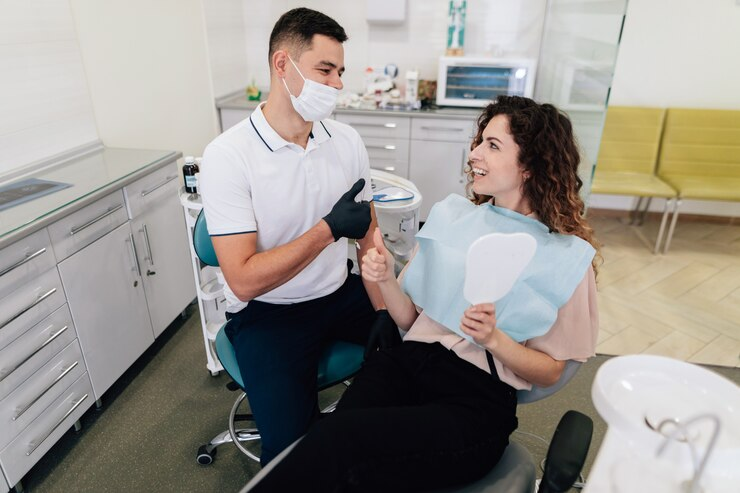Did you know that tooth decay affects more people worldwide than other health conditions? The World Health Organization says that billions of people who suffer from this problem can be avoided.
Brushing and flossing every day are important, but they are not enough. You also need to get professional dental care.
Getting checkups often involves much more than just brushing your teeth. They are an essential part of preventive health care that generally keeps your teeth and body healthy.
These regular visits help find problems early on, which keeps you from having major dental issues and paying a lot for future treatments.
Let’s talk about why going to the dentist regularly is one of the best things you can do for your health.
How Regular Dental Check-ups Help You Stay Healthy
1. Catching Problems Early: Before They Become Serious
The biggest advantage of check-ups is finding problems before they become serious. Your dentist in Hamilton can spot early signs of:
- Cavities: Finding rot early means easier fills than root canals or crowns.
- Gum Disease: Early-stage gingivitis can be corrected with professional cleaning before it grows into tooth-threatening periodontitis.
- Other Issues: Problems like teeth grinding, broken teeth, or damaged fillings can be caught quickly.
Dental X-rays help your dentist Hamilton see what’s hidden beneath the surface, including crowded teeth, bone loss, or decay between teeth. This early spotting saves small problems from becoming painful, expensive treatments later.
2. Getting Your Teeth Truly Clean
Daily brushing and flossing are important, but they have limits. Plaque forms constantly on teeth. If not removed within 24 to 48 hours, it turns into tartar, forming a rough surface that collects even more plaque. Tartar often forms in places your toothbrush and floss can’t reach.
This is why expert cleaning is important. Dental hygienists use special tools, such as ultrasonic scalers, to break up tartar layers and hand scalers to remove tartar above and below the gum line.
The cleaning ends with polishing to remove spots and smooth teeth. This smoothness isn’t just for looks—it makes it harder for new plaque to stick, helping avoid cavities and gum disease.
3. Checking for Mouth Cancer: A Potential Lifesaver
Oral cancer screening is an important part of your regular oral check-up. Your dentist checks all soft tissues in and around your mouth visually and by touch.
They check your lips, face linings, the roof of the mouth, the floor of the mouth, the tongue, and exposed throat areas. Dentists look for danger signs such as:
- Sores that don’t heal within two weeks
- Red or white patches
- Unusual lumps or thickening
- Rough areas
- Pain when chewing or swallowing
- Numbness in the mouth
While smoking, drinking, HPV, and sun exposure raise the risk, mouth cancer can affect anyone. Early discovery greatly improves survival rates—often to 80-90% when caught early—making these screenings possibly lifesaving.
4. Learning Better Brushing and Flossing Techniques
Dental check-ups offer tailored instruction beyond basic advice. Your dentist and hygienist study your case – your tooth alignment, fillings or caps, decay risk, and medical conditions like medication-cause dry mouth.
They analyze your present cleaning routine and show you exactly how to improve. Rather than simply saying, “Brush better,” they might practice the Modified Bass method, showing you how to angle brushes at your gum line with gentle strokes.
If you have trouble flossing, they can suggest tools like interdental brushes, floss threaders, or water flossers based on your needs. They might also suggest specific goods like high-fluoride toothpaste for cavity-prone patients or alcohol-free mouthwash for dry-mouth users.
This custom advice helps you keep your mouth healthy between visits.
The Bigger Picture: More Than Just Healthy Teeth
1. Stopping Dental Problems Before They Get Serious
Preventive dental care breaks the circle of oral disease. Regular cleanings clear plaque and bacteria that cause teeth and gum disease. Finding cavities early means smaller fillings that save more of your original tooth.
When dentists catch a small pit hole, they keep bacteria from going deeper into the tooth. This helps avoid bigger fillings, root taps, caps, or tooth loss.
Similarly, fixing gingivitis early through professional cleaning cures the problem before it becomes periodontitis—which causes lasting bone loss, missing teeth, and finally, tooth loss requiring expensive replacements.
Consistent preventive care stops these problems, saving you from pain and difficult treatments while keeping your natural teeth.
2. Save Money Now, Avoid Big Bills Later
Regular dental checkups cost much less than fixing problems caused by carelessness. Routine checkups, cleanings, and X-rays are cheaper than major dental work.
Twice-yearly check-ups cost a few hundred dollars per year. But a missed hole that worsens could mean thousands for a root canal and crown on just one tooth. A dental implant costs even more if the tooth can’t be saved.
Most dental insurance covers 80% to 100% of preventative care but only 50% or less of major work.
Hidden costs include time off work for accidents, dealing with pain, and getting pain medicines. Preventive care helps you avoid these unexpected costs.
Conclusion
Regular tooth checkups aren’t just another job on your to-do list—they’re a smart health investment. They avoid problems before they start and catch significant issues early. If you live in Hamilton Township, NJ, Academy Dental offers full care, including preventive, cosmetic, and corrective dentistry.
Their services help keep your smile healthy and bold for years. Schedule your visit today and take a step toward better teeth and general health.


